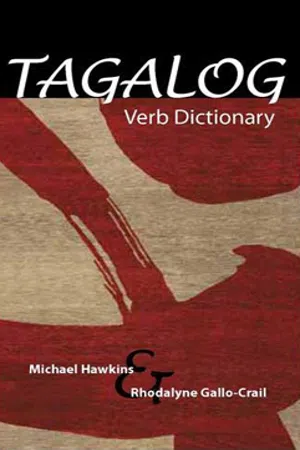
- 182 pages
- English
- ePUB (mobile friendly)
- Available on iOS & Android
Tagalog Verb Dictionary
About this book
This handy reference is a concise explanatory text and English-Tagalog/Tagalog-English verb guide designed to address and facilitate the most important aspect of Tagalog language learning—understanding and mastering the complex focal orientation of verbs. It is organized into an accessible pattern illustrating the primary conjugations that establish aspect and actor/object focus for each verb. These verbs are further enhanced by sample sentences demonstrating their usage and introducing common cultural contexts for effective communication. In addition to the verb guide, this text also provides a short history of Tagalog, an extensive explanation of verbal function in the language, and a number of learners' tips intended to ease and expedite the learning process. Taken together, these materials, along with a persistent willingness to engage the language, will facilitate a quick and effective path to fluency. Whether one is studying within the structured environment of a classroom or independently in their spare time, this book is designed to give special attention to the most critical aspects of Tagalog language learning. Tagalog Verb Dictionary's orderly and easily accessible layout and neat size make it the ideal companion for students, travelers, and anyone interested in fast fluency in the language.
Tools to learn more effectively

Saving Books

Keyword Search

Annotating Text

Listen to it instead
Information
Table of contents
- cover
- title
- copyright
- contents
- introduction
- english_tagalog_conjugation
- english_tagalog_sentences
- tagalog_english_conjugation
- tagalog_english_sentences
Frequently asked questions
- Essential is ideal for learners and professionals who enjoy exploring a wide range of subjects. Access the Essential Library with 800,000+ trusted titles and best-sellers across business, personal growth, and the humanities. Includes unlimited reading time and Standard Read Aloud voice.
- Complete: Perfect for advanced learners and researchers needing full, unrestricted access. Unlock 1.4M+ books across hundreds of subjects, including academic and specialized titles. The Complete Plan also includes advanced features like Premium Read Aloud and Research Assistant.
Please note we cannot support devices running on iOS 13 and Android 7 or earlier. Learn more about using the app